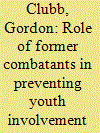|
|
|
Sort Order |
|
|
|
Items / Page
|
|
|
|
|
|
|
| Srl | Item |
| 1 |
ID:
145824


|
|
|
|
|
| Summary/Abstract |
The collapse of Greece's premier terrorist organization, the 17 November (17N) group, back in the summer of 2002 was a truly dramatic event, considering 17N's 27-year career, but it was not such a watershed event in the country's history as it was presented at the time by the mainstream political and media establishments. 17N's dismantling and imprisonment, far from demoralizing and emasculating the armed struggle movement, led to the emergence of new urban guerrilla groups and the increase and intensification of revolutionary violence. This article reassesses Greece's persistent terrorism problem by focusing on the nature, threat, and operational evolution of a new generation of political militancy.
|
|
|
|
|
|
|
|
|
|
|
|
|
|
|
|
| 2 |
ID:
145820


|
|
|
|
|
| Summary/Abstract |
Turkish support to jihadists is not merely a tactic aimed at removing Assad from power. It stems from a strategic decision on the part of Turkish authorities to influence Middle East affairs through non-state actors, much as Iran has been doing for some time. Turkey's support of jihadists transiting into Syria and its establishment of close ties with Hamas and the Muslim Brotherhood are joint aspects of this strategy. Turkish authorities have permitted Al Qaeda sympathizers to use pro-government media to promote their beliefs. The authorities have adopted a new political language that fuels anti-American and anti-Western sentiments. Prosecutors who have attempted to prevent shipments of weapons to Al Qaeda–affiliated groups in Syria have been fired and in some cases incarcerated. Indeed, by now Turkish prosecutors and the Turkish National Police are thoroughly intimidated. Not a single counterterror operation has been launched to disrupt Islamic State of Iraq and Syria (ISIS)’s networks or recruitment activities. The Turkish National Intelligence Organization has been given full responsibility to deal with jihadist activities, without any active oversight, and the police are loath to venture into their territory. As a member of the North Atlantic Treaty Organization, Turkey's jihadi policies have direct and indirect impact on Western security. This article examines Turkey's jihadi policies by examining official statements, media reports, interviews, and fieldwork.
|
|
|
|
|
|
|
|
|
|
|
|
|
|
|
|
| 3 |
ID:
145821


|
|
|
|
|
| Summary/Abstract |
Using the test cases of Afghanistan and Iraq, this study illustrates how alliances work to mitigate the conflicting frames that party structure and media access provide in the Global War on Terror, which leads to more cohesiveness in the North Atlantic Treaty Organization (NATO)–led coalition in Afghanistan as opposed to the U.S.-led coalition in Iraq. The approach utilized here extends the theory on alliance capability and uncertainty by arguing that alliances reduce uncertainty among member states on a strategic objective. This is particularly relevant when examining asymmetric, limited conflicts, where party structures and media access can work to disseminate conflicting frames to a domestic populace, who then can pressure their leader to withdraw from a coalition. The implications of these findings lend support to the continued relevance of NATO in the twenty-first-century security arena.
|
|
|
|
|
|
|
|
|
|
|
|
|
|
|
|
| 4 |
ID:
145823


|
|
|
|
|
| Summary/Abstract |
The article engages with emerging debates on the potential role returning Islamic State fighters may have in preventing violence and whether nonviolent radical ideology acts as a conveyor-belt or firewall to violence. Rather than focusing on former combatant ideologies, it demonstrates how framing processes—not ideology per se—are more salient indicators of whether former combatants will act as conveyor-belts or firewalls to violence. The analytical framework developed for analyzing framing processes is then applied to the case of Northern Ireland. It argues that ideology shapes and constrains the type of antiviolence framing that may emerge, which provides a middle ground between the two perspectives in the literature. Furthermore, the article highlights the importance of network structures, incentives, and opportunities insofar as these can shape antiviolence framing and improve resonance among audiences. While recognizing the differences between cases, the framework is then used to argue that former Islamic State combatants can play a preventative role depending on whether their antiviolence framing is based on durable structural conditions, de-glamorizes violence, and is supported by networks that incentivize its diffusion—not on whether they have denounced their ideology.
|
|
|
|
|
|
|
|
|
|
|
|
|
|
|
|
| 5 |
ID:
145822


|
|
|
|
|
| Summary/Abstract |
Despite the Canadian Security Intelligence Service's recent concern with the growing threat from right-wing extremists nationwide, we have little contemporary scholarship on the far right movement in Canada and fewer attempts to systematically analyze their ideologies and activities. Drawing on a three-year study involving interviews with Canadian law enforcement officials, community organizations, and right-wing activists, as well as analyses of open source intelligence, this article examines the endogenous factors that facilitate and inhibit the right-wing extremist movement in Canada. Findings suggest that strengths and weaknesses of the groups themselves can be exploited as a means of debilitating them.
|
|
|
|
|
|
|
|
|
|
|
|
|
|
|
|
|
|
|
|
|